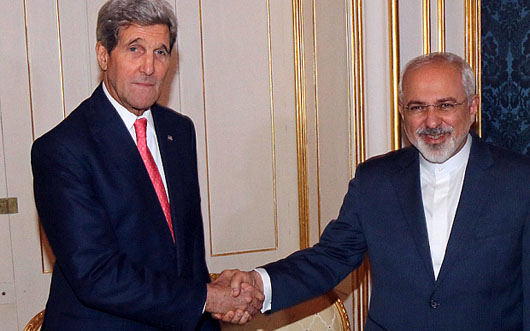Special to WorldTribune.com
UNITED NATIONS — Just days after the global sigh of relief regarding the upcoming United States-North Korea Summit, world opinion swung back into bitter criticism over the Trump Administration’s announcement that it was scrapping America’s participation in the Iran Nuclear Deal, the penultimate diplomatic legacy of the Obama Administration.
Indeed the biggest political pushback to Trump’s widely anticipated policy turnaround was from Western Europe, not the Middle East nor China. The U.S. decision is supported by a curious group of friends including Israel, Saudi Arabia, and most Arab countries.

The Iran Deal as it is known, was framed by the five Permanent members of the UN Security Council; China, France, Russia, the United Kingdom, the United States as well as Germany to presumably contain what was a dangerously expanding nuclear weapons research and development program by the Islamic Republic of Iran.
Keeping Iran from getting nuclear weapons was the goal of the agreement. Officially known as the Joint Comprehensive Plan of Action (JCPOA), the deal would theoretically keep Teheran’s nuclear weapons ambitions “in the box.”
President Trump countered, “This was a horrible one-sided deal that should have never, ever been made.” European countries saw the pullout very differently and as a step towards a wider rupture in transatlantic ties. The Deal may still continue without Washington’s participation.
Crafted in Vienna’s stunningly stately but small Palais Coburg, the “Deal” reached in 2015 was actually an Obama Executive Agreement and not a Treaty and thus circumvented U.S. Senate approval, which it would never have gained.
Once the ink had dried, economic sanctions on Islamic Iran were lifted by the United States and the Europeans. Before long, European businessmen were flooding the Iranian capital Teheran in search of their own commercial Deals. The Americans soon followed.
Prior to the tougher economic sanctions on Teheran in 2012, the European Union states were Iran’s biggest trade partner. U.S. relations remain rooted in the poisoned ties between Washington and Teheran since 1979 and the seizure of the American Embassy as well as the nuclear crisis.
Yet by 2017 European Union exports to Iran reached $13 billion with imports from the Islamic Republic worth $12 billion. Predictably most EU imports are energy related.
China, the European Union and India remain Iran’s primary trading partners. France’s Total Oil has signed accords of $5 billion to help develop the world’s largest gas field. Equally Renault auto will expand current co-production in Iran to boost output to 350,000 vehicles annually. The Franco/German consortium Airbus planned to sell 100 civilian airliners to Iran.
Late in the Obama Administration, Boeing had inked plans to sell over 100 jets to Iran’s civilian Airlines in a highly controversial move which has since been stopped.
Yet the lure of Europe’s $25 billion two-way trade with Islamic Iran starkly contrasts with the EU’s $755 billion trade with the USA. Stated another way, the annual EU/Iran trade equals about two weeks worth of U.S. trade with China!
Many major Western European companies viewed Islamic Iran as a potential commercial bonanza, as it was in the period prior to the so-called Islamic Revolution in 1979, have been deeply disappointed. Still the European powers remain politically vested in the agreement.
Transatlantic ties are being strained yet again, this time not over NATO budget shortfalls, but the fact that Washington will revive economic sanctions on Iran which not only forbids American companies, but may bar foreign firms from investing and trading with the Islamic Republic. So-called “secondary sanctions” could affect European companies in six months.
Iran’s nuclear weapons development posed a clear and present danger to Israel, moderate Arab states and to Europe as well. Yet viewing Iran through the wider lens beyond the nuclear deal there are strategic threats posed by the Islamic Republic to neighboring countries and regional states. From its support of Hizbullah in Lebanon threatening Israel, to being an active player in the Syrian civil war, to its deep involvement in the Yemen conflict, Iran’s wider export of terrorism, and meddling in Iraq, Teheran remains an active player in regional destabilization.
This all comes at a socio/political cost to Teheran’s rigid theocracy.
Iran’s political landscape is still rumbling from the reverberations of last Winter’s nationwide protests. Equally Iran’s economy remains dysfunctional given the corruption and poor management of the Islamic regime. Inflation remains an albatross to the system. The middle class is hurting. Above all the regime remains a tyranny to its own citizens.
Where then is the deal to help Iran’s people?
John J. Metzler is a United Nations correspondent covering diplomatic and defense issues. He is the author of Divided Dynamism the Diplomacy of Separated Nations: Germany, Korea, China (2014). [See pre-2011 Archives]

 By
By